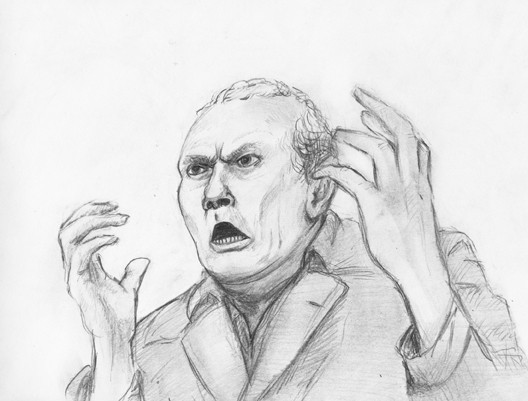This is mass madness, you maniacs!
The tale of Howard Beale and the humanoid culture
Less than three per cent of you people read books. Less than 15 per cent of you read newspapers. The only truth you know is what you get over this tube. Right now, there is an entire generation that never knew anything that didn’t come out of this tube. This tube is the gospel, the ultimate revelation. This tube can make or break presidents, popes, prime ministers. This tube is the most awesome goddamn force in the whole godless world. Woe is us if it ever falls into the hands of the wrong people.
Television is not the truth. Television’s a goddamn amusement park. Television is a circus, a carnival, a traveling troupe of acrobats, storytellers, dancers, singers, jugglers, sideshow freaks, lion tamers and football players. We’re in the boredom-killing business. We deal in illusions, man. None of it is true!
But you people sit there, day after day, night after night, all ages, colors, creeds. We’re all you know! You’re beginning to believe the illusions we’re spinning here! You’re beginning to think that the tube is reality and that your own lives are unreal.
You do whatever the tube tells you. You dress like the tube. You eat like the tube. You raise your children like the tube. You even think like the tube.
This is mass madness, you maniacs! In God’s name, you people are the real thing. We are the illusion!
—Howard Beale, Network
When Sydney Lumet’s anti-media opus Network premiered in 1976, many people didn’t know what to make of it. The film, which follows the lives of a seasoned journalist of integrity Max Schumacher (William Holden), his fellow newsman-turned raving prophet Howard Beale (Peter Finch) and their amoral ratings-thirsty television programmer Diana Christensen (Faye Dunaway), is a timely satire which, in many ways, predicted much of the world we live in today.
From Beale’s startling observations about our culture (“This is no longer a nation of independent individuals, it’s a nation of 200 some-odd million transistorized, deodorized, whiter-that-white steel-belted bodies…”), to UBS, the television network in the film, turning its news division over to its entertainment division in order to acheive higher ratings, to its programmer creating a hit reality television show (The Mao Tse-Tung Hour) which follows a terrorist organisation around as they commit violent crimes.
“ As you gaze at the flickering signifiers scrolling down the computer screens, no matter what identifications you assign to the embodied entities that you cannot see, you have already become posthuman.
N. Katherine Hayles, literature professor, Duke University
The de-humanization of television is old news. After 10 solid years of exploitive, niche-driven reality television (17 if you count MTV’s The Real World), few things are left to be said.
But Howard Beale’s hell-fire rage was not simply about television itself, but was about our growing humanoid culture, and our reliance upon information media. That induced de-humanization is far more attributed to our dependance on the Internet today, than to televison.
But is this a correct comparison? The Internet may be primarily a boredom-killer, but it’s not a programmed entity to be feared. The Internet can in fact be liberating, allowing people the freedom to choose the information they take in.
Henry Jenkins, former co-director of the Comparative Media Studies program at MIT, argued that public schools are in fact the problem, not the Internet.
“Schools are bureaucracies. They’re based on fixed relationships between teachers and learners, bureaucratic structures, regulations, one-size-fits-all, standardized curriculums and standardized testing,” said Jenkins in a recent interview with Frontline. “The Internet is based on collective intelligence; we learn from each other. In a world of collective intelligence nobody knows everything, everybody knows something, anything that an individual member knows is accessible to the social network as a whole. School is still based on the notion of the autonomous learner.”
In many ways, this both rejects and confirms Beale’s fears. While this collective intelligence that Jenkins talked about sounds helpful, this is essentially where the idea of a ‘humanoid’ culture comes from, where everyone knows what everyone else knows, from the public information to the very private.
N. Katherine Hayles, a literature professor at Duke University, argued that we are not living in the humanoid age, but the post-human. In her book, How We Became Posthuman, she discusses the evolution of the “cyborg,” testing cybernetic circuits spliced with human traits, such as unique wills, desires and perceptions, to see if a human interfacing with it, and other humans, can tell the real human from the fake one.
“As you gaze at the flickering signifiers scrolling down the computer screens, no matter what identifications you assign to the embodied entities that you cannot see, you have already become posthuman,” she writes.
This begs the question: is the Internet simply an inhuman reflection of ourselves? Or is it simply an expansive library the world has never before known?
This ongoing social discussion likely will never see its resolution. But since the use of social networking sites allowing members to customize their profiles and create their own identities has already become seemingly bourgeois, perhaps we are living in the posthuman world afterall.
Published in Volume 64, Number 13 of The Uniter (November 26, 2009)







